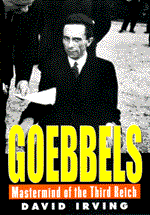|
REVISITING A REVISIONIST St Martin's Press came this close to publishing a Nazi-philic biography of Goebbels. Wasn't anybody paying attention? by Paul Gray IN THE GOOD old days, book publishers had a pretty fair idea of what they would and would not print; since their names, often literally, went on the finished products, their reputations were as much at stake as those of their authors. But once publishing transformed itself into a business of battling behemoths, the clubby, gentlemanly code of ethics grew harder to enforce or even, in some minds, to justify. Do publishers still put a stamp of approval on their books, or are they now merely commercial conduits between writers and readers? That question lay behind an event last week that rattled the U.S. publishing world. After several weeks of growing protests, St. Martin's Press announced that it had canceled its planned release next month of British historian David Irving's biography Goebbels: Mastermind of the Third Reich. St. Martin's chairman Thomas J. McCormack denied that his house had succumbed to "coercion," which included a swelling tide of unfavorable press stories, criticism from the Anti-Defamation League of B'nai B'rith and, according to some employees, telephoned death threats. Instead, McCormack said, a few of the protesters had prompted him to take a closer look at Irving and his book on Hitler's chief propagandist: "I at last sat down to examine the page proofs myself." That was a good, if belated, idea. But McCormack's claim that nobody at St. Martin's was aware of Irving's reputation prompted widespread incredulity. A prolific writer with a knack for gaining access to original source material, Irving has also been for some 20 years a notorious and very public apologist for Adolf Hitler and the Third Reich. He has said there is "not one shred of evidence" that 6 million Jews were murdered by the Germans during World War II. In Hitler's War (1977) he made the somewhat contradictory argument that if there was a Holocaust, Hitler knew nothing about it. Of all this, McCormack insists, "we were ignorant, and to the extent that that ignorance is a failure on our part, then we deserve some of this heat." St. Martin's is not the first U.S. publisher to yank a controversial book off its list. In the most celebrated recent instance, Simon & Schuster decided in 1990 not to release Bret Easton Ellis' novel American Psycho after advance reviewers complained about its voyeuristic scenes of women being tortured. (Knopf later bought the discarded manuscript and published it in paperback.) But the St. Martin's case is more complex because it involves a work of nonfiction rather than a question of artistic license. Should publishers vouch for the accuracy of their books? | |
As Goebbels unwinds, the distance between biographer and subject grows harder to detect. In an all-too-typical example, Irving paraphrases the content of a Goebbels speech in 1937: "In Russia, said Goebbels, Stalin had murdered 42,000 priests; in Spain, his agents had already killed 17,000 priests and monks by February; yet the world resounded with squawks of horror if one Jew in Germany had his ears deservedly boxed." As a snippet of historical prose, this passage is not only worthless but also insidious. Why the indirect discourse? If that is what Goebbels said, why not quote him directly? Are his figures accurate? The nonspecialist reader, at whom Goebbels is aimed, receives nothing here except the impression that Jews in Nazi Germany had little to complain of except -- is this odd conceit Goebbel's or Irving's? -- the boxing of their ears. Imagine a biography of Jeffrey Dahmer that discusses reasonably the dietary pros and cons of cannibalism. That is the sort of historical insight provided by Goebbels. In London, Irving responded to the St. Martin's cancellation as the maligned victim of conspiracy and censorship. "I think that this kind of action by the organized Jewish community can only lead to an increase in anti-Semitism," he told TIME, "because the general public will regard it as 'the Jews' throwing their weight around again.'" But the prospect of Goebbels bearing a reputable
publisher's imprint is offensive to believers of all
stripes. It is important to remember that publishers merely
reject manuscripts, which is not the same thing as banning
books, as any historian of the Third Reich should know. It
took an unconscionably long time, but St. Martin's finally
did the right thing. | ||


 Irving
gave St. Martin's a manuscript ostensibly crammed with
facts, based on 75,000 pages of Joseph Goebbels'
previously undiscovered private diaries
(right). No editor could be
expected to double-check all this stuff, but a third-grader
should have noticed that Irving had done some tricky things
with it. First of all, his emerging thesis is that the
occasional lapses of the Third Reich can be blamed on
Goebbels rather than on Hitler. "Hitler doesn't want to hurt
anybody," Irving quotes Goebbels as writing. Maybe he wrote
this, but why should anyone, starting with Irving, believe
it?
Irving
gave St. Martin's a manuscript ostensibly crammed with
facts, based on 75,000 pages of Joseph Goebbels'
previously undiscovered private diaries
(right). No editor could be
expected to double-check all this stuff, but a third-grader
should have noticed that Irving had done some tricky things
with it. First of all, his emerging thesis is that the
occasional lapses of the Third Reich can be blamed on
Goebbels rather than on Hitler. "Hitler doesn't want to hurt
anybody," Irving quotes Goebbels as writing. Maybe he wrote
this, but why should anyone, starting with Irving, believe
it?